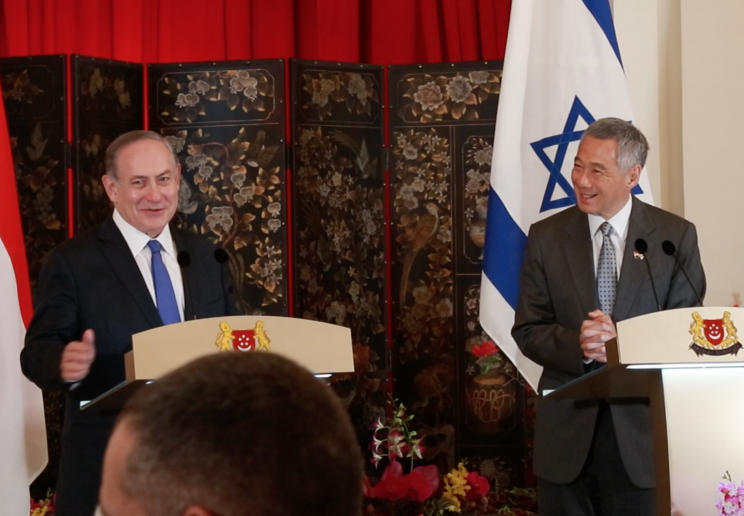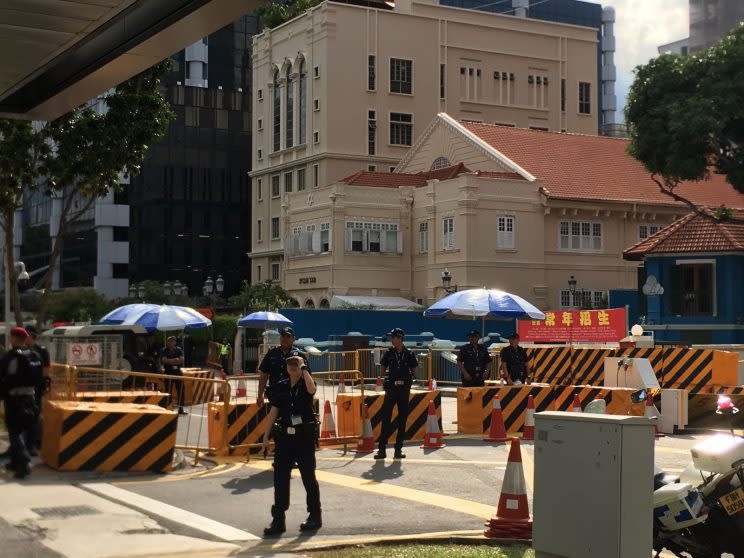COMMENT: The security and religious factors behind Israeli PM Netanyahu's low-key visit to Singapore

Israeli Prime Minister Benjamin Netanyahu left Singapore for Australia on Tuesday (21 February), signaling the end of a low-key visit to the Republic by one of the world’s most high-profile politicians.
In the days leading up to and during Netanyahu’s visit on Monday and Tuesday (20-21 February), there were few articles in mainstream media about the historic event – the first ever official visit by a sitting prime minister of Israel. The first mention of his planned visit came from Israeli media outlets, such as the Jerusalem Post, in October last year.
During his visit, Netanyahu held discussions with President Tony Tan, Prime Minister Lee Hsien Loong, and Deputy Prime Minister and Coordinating Minister for National Security Teo Chee Hean. He also attended a dinner hosted by Lee, met members of the Jewish community in a synagogue, and visited the Toa Payoh estate.
The Jerusalem Post said in an article on Monday, “Despite the pomp and circumstance, the Singaporeans have requested a relatively low profile for the visit.” If the intention was to keep media attention to a minimum, the timing of the visit couldn’t have been better – Netanyahu’s first day of visit happened to coincide with Budget Day in Singapore.
It might seem surprising to some that the visit by the leader of a country that wields a disproportionately big influence on the world stage relative to its size and has a longstanding relationship with Singapore was accorded low profile status.
But there was a credible reason for the relevant authorities to do so: high security.
The Chaim Herzog controversy
Singapore’s relationship with Israel is possibly the most sensitive among all the diplomatic ties that it has established. It began in the 1960s when several Israeli officers came to Singapore disguised as “Mexicans” to train the nascent local army.
Since then, the ties have evolved to also encompass the economic, business, research and development, and cultural arenas.
But it is a relationship that isn’t warmly received in some circles in the immediate region dominated by Muslim-majority countries.
Malaysia, Indonesia and Brunei do not have diplomatic relations with Israel, and over the decades they have steadfastly condemned the Jewish state for what they perceive as its annexation of Arab territories and the harsh treatment of its Palestinian population.
In November 1986, the planned visit by then Israeli President Chaim Herzog to Singapore sparked a hailstorm of protests from the three Asean neighbours before his arrival, particularly in Malaysia. Several Malaysian politicians issued threats to cut off diplomatic ties and the water supply from Johor to Singapore. One Malaysian politician even lay on a railway track in Johor Bahru in a move to stop a Singapore-bound train.
The visit by Herzog came and went without any untoward incident in Singapore amid high security. But the controversy stirred by his visit was a reminder that broader religious and political sensitivities would always come into play in Singapore-Israeli relations.
During the joint media briefing with Netanyahu on Monday, PM Lee said that the Israel-Palestine issue was an “emotional” one, especially for Muslims, and reiterated Singapore’s support for a two-state solution between the Israeli and Palestinian people.
“I explained (to Netanyahu) why while the Middle East is far away from Southeast Asia, it has an impact on us and it’s of considerable concern for us. We ourselves have a significant Muslim population who are an important part of our harmonious multi-racial society,” Lee said.

Security arrangements for Netanyahu’s visit
Since the Chaim Herzog controversy, the rhetoric from regional politicians against Singapore-Israel ties has eased considerably. Before Netanyahu’s visit, current Israeli President Reuven Rivlin, the late Prime Minister Yitzhak Rabin, and other ministers from the Jewish state had also made the same trip without triggering any protests in the region.
What could have been of greater concern to security authorities in the lead-up to Netanyahu’s visit were the potential terrorist threats posed by extremist groups or lone wolves.
In March 1985, a bombing incident happened at the Faber House in Orchard Road, where the Israeli embassy was then located. A Palestinian guerrilla who was captured by the Israeli army confessed in 1991 that he had planned the bombing and targeted the embassy. In December 1986, an explosion also took place in the same site. In both incidents, no one was injured.
Herzog’s visit and the two Faber House incidents happened when the global war against terror was many years away. Since the 9/11 attacks, Singapore authorities have arrested a number of local and foreign extremists under the Internal Security Act.
While the task of making security arrangements for leaders of other countries visiting Singapore is par for the course, it was escalated to another level when Netanyahu was here. Israeli security personnel were guarding three entire floors of the hotel where the PM was staying, according to a person familiar with the matter. When Netanyahu visited the Maghain Aboth synagogue on Monday, several streets were sealed off while a heavy security presence was seen around the Waterloo Street vicinity.
Despite the delicate security and religious considerations, by going ahead with Netanyahu’s visit, Singapore is reaffirming a longstanding principle by which it has anchored its place on the global political stage.
Just weeks after Herzog left Singapore, then Foreign Affairs Minister S. Dhanabalan told Parliament, “As a sovereign country, Singapore has the right to invite and to receive any representative of any country it has relations with.”


